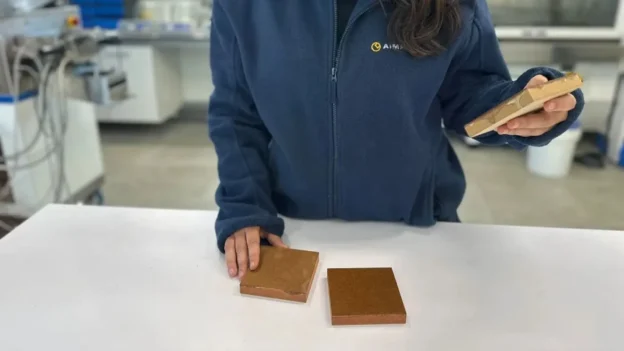AIMPLAS is developing new flame retardant composites and coatings with an environmentally responsible approach. The REFUGI and NEOCOMP projects, supported by IVACE+i and funded by FEDER, address this need from green chemistry and advanced manufacturing technology.
Mechanochemistry-based flame-retardant coatings and compounds
The REFUGI initiative is focused on developing phosphorus-based flame retardants using mechanochemical processes that dispense with solvents. These additives are integrated into wood coatings, providing functional finishes without compromising aesthetics. The aim is to optimize both fire resistance and process sustainability.
The research, in collaboration with Omar Coatings and Decomader, prioritizes recyclable and renewable materials, while seeking efficiency in the application of coatings. This approach improves the distribution of the flame-retardant additive on complex surfaces and advances solutions applicable to the construction sector.
The NEOCOMP project, meanwhile, addresses the manufacture of fire-retardant composite materials with superior mechanical properties. By using technologies such as dry fiber placement and 3D printing to create customized, efficient and resistant parts.
Some thermoplastic binders, unidirectional reinforcement tapes and continuous filaments allow the design of preforms with complex geometries and multiple applications. This line of work, in collaboration with Ziur Composites and IT3D, is designed for critical infrastructures in sectors such as mobility and aerospace.
Both projects increase the commitment of AIMPLAS to a more circular industry. By employing techniques that reduce resource consumption and minimize environmental impact, we are moving towards real solutions for fire safety without compromising production efficiency. These developments allow companies to comply with demanding technical regulations and respond to the demand for functional and sustainable materials.
Source and photo: AIMPLAS

